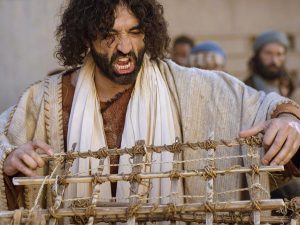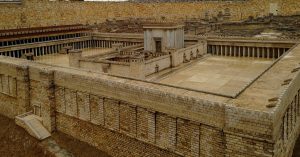03 Mar SUNDAY, MARCH 3, 2024
Gee whiz. What’s the deal with Jesus on the outskirts of the temple today? I wonder if he’s sending a message that goes something like this: Don’t make religion a commodity. Don’t let loyalty to God become an industry or make the wares of worship things to be traded for gain. Ooo, Lordy. Hasn’t every religion done that in spades?
A commodity is merely something of value and there’s nothing wrong with religion holding value. The problem lies in making religion something that involves the exchange of money for goods: making the buying and selling of things central to the practice of faith in God.
 Let’s see how many commandments were broken by the moneychangers found on temple grounds. First of all, it’s worth noting that a requirement to offer animal sacrifice as a means to atone for sin isn’t mentioned in The Ten Commandments, at all. So,let’s see where that idea originates, the Book of Leviticus, described as “a manual for priests,” according to The Harper Collins Study Bible.
Let’s see how many commandments were broken by the moneychangers found on temple grounds. First of all, it’s worth noting that a requirement to offer animal sacrifice as a means to atone for sin isn’t mentioned in The Ten Commandments, at all. So,let’s see where that idea originates, the Book of Leviticus, described as “a manual for priests,” according to The Harper Collins Study Bible.
Their intro reads like this, “The Book of Leviticus emphasizes that moral sins and physical impurities lead to pollution of the sanctuary and expulsion from the land of God’s people, Israel. Priests were tasked with instructing the Israelites how to not cause defilement and to purge the sanctuary whenever it is defiled,” and that’s exactly what Jesus did. “Ethical elements fuse with and inform ritual so that there is a moral basis to every ritual act” .
Now there’s a connection to The Ten Commandments. Make note that there’s a moral basis for the behavior that God expects from us, reasons that people are instructed to either act or refrain from acting. What Jesus did all makes sense now, right? He was demonstrating once again, that he is the fulfillment of OT law and prophecy.
He is the great high priest who visibly and tangibly connects ancient Hebrew laws of purity and righteousness to God’s living word and decisive actions. It’s no coincidence that once God brought his children out of the house of slavery, that he didn’t want them becoming slaves again to anything or anyone in the temple, God’s house on earth. “Priests had responsibility for the welfare of all Israel and oversaw every aspect of animal sacrifice so that if performed as prescribed, the offerer would dutifully handle the animal in such a way that when the priest took over the ritual at the altar, sacred purity would be maintained during the exchange of hands before presentation to Almighty God.”
Are you starting to see why Jesus was upset by what he witnessed? Okay, back to seeing how the first reading ties into the gospel. Harper Collin’s Study Bible goes on to say that according to the Holiness code, “Spacial holiness is not limited to the sanctuary, it coextensive to the promised land and the holiness of persons is not limited to priests, but extends to all. All of the land is holy, therefore those who reside on it are to keep it that way by observing God’s commandments. Violations of the covenant between God and people may happen inside the sanctuary or outside of it, they must be confessed and addressed through either ritual purification or expulsion.”
Wow. Things are actually starting to make sense. When Jesus’ disciples remember Psalm 69:9 which reads, “It is zeal for your house that has consumed me; the insults of those who insult you have fallen on me,” this makes sense, too. Harper Collins seems to suggest that “Jesus experiences the insult himself since God is the one who is the ultimate object of insult.” In this case the insult amounts to defiling the temple and God’s people by polluting religious observance with mercenary practices.
Again, the Jews wonder by what authority Jesus acts. He answers, “Destroy this temple, and in three days I will raise it up.” This is where Jesus cosigns The Ten Commandments by declaring, “There is but one temple, which is my body. This is the one and only place that houses God.”
He deserves to be worshiped rather than any place. He is the object of devotion and dedication rather than the form of any other thing in heaven above, on the earth beneath, or in water under the earth. To no temple or statue should you bow down or worship; for I the Lord your God am a jealous God. Holiness is important, keep my name holy, along with the Sabbath.
The Jews then said, “This temple has been under construction for forty-six years, will you raise it up in three days?” After he was raised from the dead, his disciples remembered that he had said this; and they believed the scripture and the word that Jesus had spoken.
The apostle Paul says it best, “The message about the cross is foolishness to those who are perishing, but those being saved it is the power of God. Jews demand signs and Greeks desire wisdom, but we proclaim Christ crucified.To those who are called, Christ is the power and wisdom of God. God’s foolishness is wiser than human wisdom, and God’s weakness is stronger than human strength.
Every gospel lesson boils down to a matter of trust. Will you trust in the means, the persons and objects we do business with and with whom we engage in trade, or will you trust in the very source of life, the one person to whom we owe our freedom, to whom we ought to devote our time, energy, resources, and religious practice?
I began by asking whether Jesus’ message for us might be this: Don’t make religion a commodity. Don’t let loyalty to God become an industry or make the wares of worship things to be traded for gain. At this point, I might add. Don’t make religion a bargaining chip in politics. Don’t let loyalty to God become zeal to protect business interests. Don’t allow the wares of worship, be traded for gain.
It seems as though we worship more than God alone. For one thing, we worship freedom rather than the one who sets us free. Rather than accept being dependent upon God alone, we worship independence, which is sometimes considered self-rule or self-determination. What was the point of Moses delivering The Ten Commandments? To refer humankind to a set of rules and guide us into a way of living so that according to commentary from Sundays and Seasons, “life of the community flourishes, [as it will] when based on honesty, trust, fidelity, respect for life, family, and property.”
There we have it. A better understanding of what Jesus was about on the outskirts of the temple, what God was about on top of Mt. Sinai, and what we might be about going forward from this place of worship.
The psalmist wrote, “The teaching of the Lord is perfect and revives the soul; the testimony of the Lord is sure and gives wisdom to the simple. The statutes of the Lord are just and rejoice the heart; the commandment of the Lord is clear and gives light to the eyes.”
If we order the phrases a bit differently, they say this: The Lord’s teaching, testimony, and commandments are perfect and sure, clear and just. They revive the soul, give wisdom to the simple, rejoice the heart and give light to the eyes. Does any of that sound unappealing? What the psalmist declares is plain truth. It’s in our best interests to listen and learn from what we are told.
The teaching of the Lord is perfect and revives the soul; the testimony of the Lord is sure and gives wisdom to the simple. The statutes of the Lord are just and rejoice the heart; the commandment of the Lord is clear and gives light to the eyes.
The gospel or good news is this: In the form of Jesus Christ, God not only delivered his and restated his word in person, he demonstrated how consistently God values the separation between holiness and profanity. We usually only think of profanity as bad language, but in fact, the word refers to anything disrespectful or irreverent.
The psalmist went on to say that keeping God’s commandments ought to be desired. Why? Because by doing so, we will become enlightened and obtain a great reward. Hmm. I wonder if this is where people become misled into the belief that doing the right thing leads to being spared from sickness and death.
Every week, I have at least one patient tell me that they don’t understand why God has allowed them or a family member to become so ill. Their reasoning goes like this, “I’ve always tried to do the right thing, why is this happening to me? Or I’ve made the effort to treat people well throughout my entire life, and now this? I don’t know how to trust God anymore.”
I went through something similar myself at age 25 when my mom died. She was a devout Christian woman and so was I. We had a very close relationship and deeply bonded emotionally. In fact, she’d been my very best friend throughout my entire life. I deeply believed that God knew the deepest longings of my heart and understood what her loss would mean to me, but God took her anyway. I didn’t know how to trust God completely, or exactly in the same way after that.
How is it possible to become whole and sound after experiencing what feels like brokenness? How can fear that is related to God’s awesome power over our lives and bodies, or fear related to suffering and judgment be overcome? How can losing our health or the presence of a loved one be reconciled to a God who claims to be trustworthy, but does not exempt us from bad circumstances or worse?
To start with, we must decide who God is. Is God a heavenly scorekeeper who sits way up high in a box overhanging the earth like it’s some marked playing field? Are the commandments lines spray painted on grass, drawn with chalk lines or painted on hard wood surfaces? Is God someone with a pen and book who notes every player’s jersey number and makes hash marks for goal points and adds up personal and team fouls?
Does God reward only the players who make him look good, who rank “up there” with regard to Christian team standings? Does he only play his first string players and show favor to those who score by doing everything as told, making every play count, making God as the coach, our teammates and families proud? On some level, we all think so.
Let us pray. In some ways, Lord, the commandments seem like speed limits and speedometers. They are useful at detecting our tendency to push boundaries. They let us know when we risk going out of bounds, foolishly endangering our own lives or the safety of others around us.
Be our wisdom and strength under all circumstances, and let your word dwell within our hearts and mouths. We dearly desire to be acceptable in your sight. As you gaze upon our weakness, we give thanks that you always see us through the precious light of your Son, Jesus Christ, the pure, holy one, our greatest reward and only source of redemption. In your holy name we pray, Amen.


